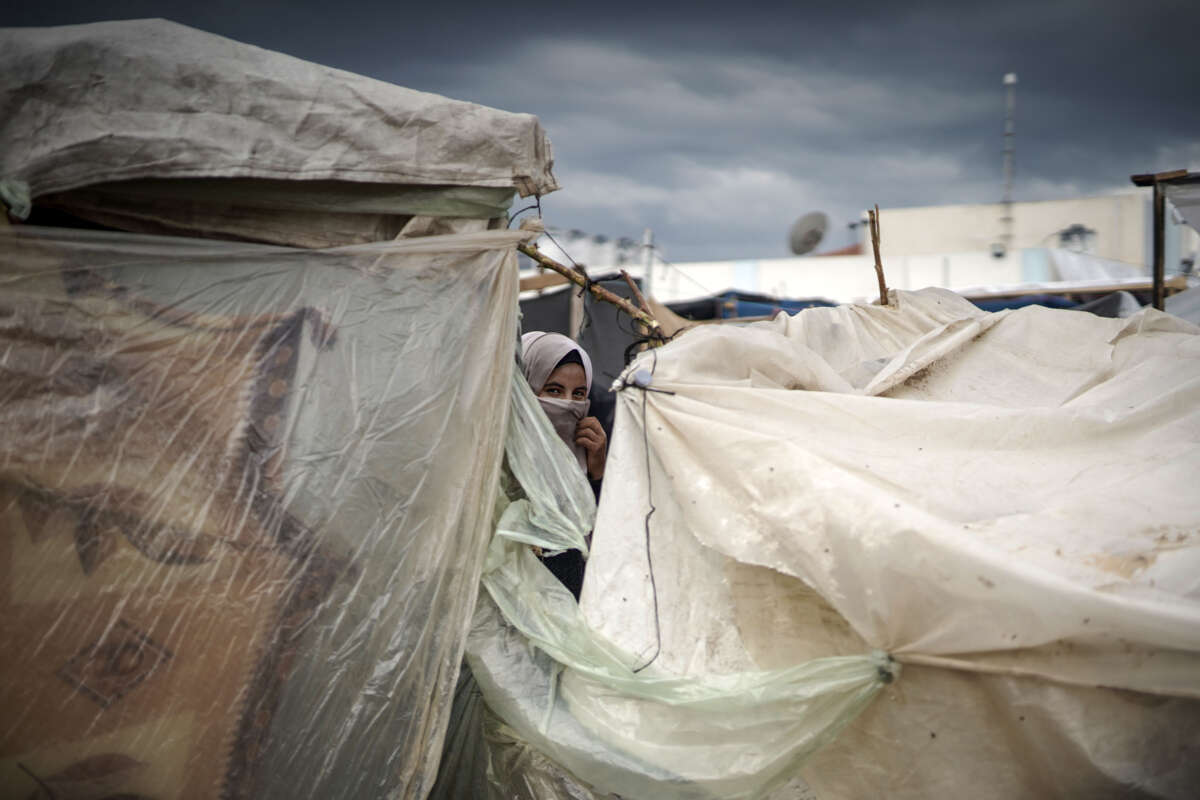The number of Palestinians in Gaza who have been displaced from their homes has risen to roughly 1.7 million as of November 19, according to an update from the United Nations this week. UN Secretary-General António Guterres has decried the humanitarian crisis in the region as “unparalleled.”
The number represents over three-quarters of the population of Gaza that has now been forcibly displaced by Israeli bombardment and raids over the past weeks. UN Relief and Works Agency (UNRWA) shelters, which are housing 930,000 people across Gaza, are severely overcrowded and have seen a 35 percent increase in skin diseases and a 40 percent rise in diarrhea cases over the past two weeks, reports the agency.
The spread of disease is due to unsanitary conditions, the UNRWA said. There is on average only one shower unit per 700 people, and one toilet for every 160 people in agency shelters. This varies widely based on location; in one former logistics base in Rafah, now turned into a shelter housing over 8,000 people, there are 400 people sharing one toilet.
“We are witnessing a killing of civilians that is unparalleled and unprecedented in any conflict since I have been secretary-general,” said Guterres at a press conference on Monday. Human rights organizations and experts have been warning that Israel is carrying out ethnic cleansing of Gaza.
The death toll of Palestinians in Gaza is at least 14,128, according to the Palestinian government, including at least 5,600 children. At least 30,000 people have been injured, as the health system has nearly completely collapsed, with only a quarter of hospitals in the region still functioning and only 9 of the UNRWA’s 22 health centers still operational. Israel’s genocide has broken innumerable records since October 7, including the killing of a record number of journalists – 53 so far – and the most number of children killed in conflicts around the world since 2019.
The UNRWA’s aid capacities have been drastically reduced amid Israel’s blockade, the agency said, and over 100 UNRWA workers have been killed. Israeli authorities have authorized the entry of fuel into the region that the UNRWA says will only fulfill a fraction of the daily need. Meanwhile, sewage is flooding parts of Gaza as it cannot be removed, and access to clean drinking water has been cut by a third. There is also a dire shortage of food, with food stocks at risk of running out in a week.
Water is an especially pressing need. According to an Oxfam report released Friday, water levels in Gaza are at 17 percent of pre-siege levels, with water treatment and distribution made “virtually impossible” by the fuel shortage imposed by Israeli forces.
The international standard for water per person to take care of basic needs is 15 liters a day, or about 4 gallons. Currently, Oxfam has found that many people in Gaza have access to less than a gallon a day per person, while the amount of water that aid trucks were able to deliver into Gaza via the Rafah crossing between October 21 and November 12 was equivalent to less than half a gallon per person. No aid has entered via the Rafah crossing since November 14, Oxfam reported.
“The water is disgusting, most people are having to drink brackish water from wells,” said an Oxfam staff member in Gaza. “There is no electricity, so we have to fill buckets and carry up to the roof tank. Our whole family are sick with diarrhea.”
Oxfam America President and CEO Abby Maxman said that Israel’s blockade of supplies like food, water, electricity and fuel is against international law.
As Palestinians in Gaza are facing mass displacement and extreme difficulty fulfilling basic human needs, they are also facing bombardment by Israeli forces and no safe place to shelter from the shelling. Just on Tuesday, Israeli forces shelled al-Awda Hospital in Jabalia, killing three doctors and severely injuring other hospital staff.
Our most important fundraising appeal of the year
December is the most critical time of year for Truthout, because our nonprofit news is funded almost entirely by individual donations from readers like you. So before you navigate away, we ask that you take just a second to support Truthout with a tax-deductible donation.
This year is a little different. We are up against a far-reaching, wide-scale attack on press freedom coming from the Trump administration. 2025 was a year of frightening censorship, news industry corporate consolidation, and worsening financial conditions for progressive nonprofits across the board.
We can only resist Trump’s agenda by cultivating a strong base of support. The right-wing mediasphere is funded comfortably by billionaire owners and venture capitalist philanthropists. At Truthout, we have you.
We’ve set an ambitious target for our year-end campaign — a goal of $250,000 to keep up our fight against authoritarianism in 2026. Please take a meaningful action in this fight: make a one-time or monthly donation to Truthout before December 31. If you have the means, please dig deep.
